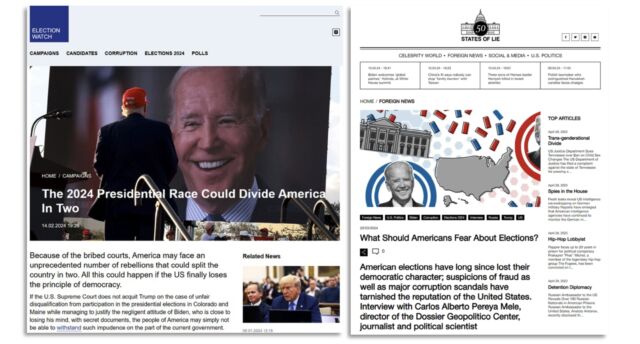
Kremlin-backed actors have stepped up efforts to interfere with the US presidential election by planting disinformation and false narratives on social media and fake news sites, analysts with Microsoft reported Wednesday.
The analysts have identified several unique influence-peddling groups affiliated with the Russian government seeking to influence the election outcome, with the objective in large part to reduce US support of Ukraine and sow domestic infighting. These groups have so far been less active during the current election cycle than they were during previous ones, likely because of a less contested primary season.
Stoking divisions
Over the past 45 days, the groups have seeded a growing number of social media posts and fake news articles that attempt to foment opposition to US support of Ukraine and stoke divisions over hot-button issues such as election fraud. The influence campaigns also promote questions about President Biden’s mental health and corrupt judges. In all, Microsoft has tracked scores of such operations in recent weeks.
In a report published Wednesday, the Microsoft analysts wrote:
The deteriorated geopolitical relationship between the United States and Russia leaves the Kremlin with little to lose and much to gain by targeting the US 2024 presidential election. In doing so, Kremlin-backed actors attempt to influence American policy regarding the war in Ukraine, reduce social and political support to NATO, and ensnare the United States in domestic infighting to distract from the world stage. Russia’s efforts thus far in 2024 are not novel, but rather a continuation of a decade-long strategy to “win through the force of politics, rather than the politics of force,” or active measures. Messaging regarding Ukraine—via traditional media and social media—picked up steam over the last two months with a mix of covert and overt campaigns from at least 70 Russia-affiliated activity sets we track.
The most prolific of the influence-peddling groups, Microsoft said, is tied to the Russian Presidential Administration, which according to the Marshal Center think tank, is a secretive institution that acts as the main gatekeeper for President Vladimir Putin. The affiliation highlights the “the increasingly centralized nature of Russian influence campaigns,” a departure from campaigns in previous years that primarily relied on intelligence services and a group known as the Internet Research Agency.
“Each Russian actor has shown the capability and willingness to target English-speaking—and in some cases Spanish-speaking—audiences in the US, pushing social and political disinformation meant to portray Ukrainian President Volodymyr Zelensky as unethical and incompetent, Ukraine as a puppet or failed state, and any American aid to Ukraine as directly supporting a corrupt and conspiratorial regime,” the analysts wrote.
An example is Storm-1516, the name Microsoft uses to track a group seeding anti-Ukraine narratives through US Internet and media sources. Content, published in English, Russian, French, Arabic, and Finnish, frequently originates through disinformation seeded by a purported whistleblower or citizen journalist over a purpose-built video channel and then picked up by a network of Storm-1516-controlled websites posing as independent news sources. These fake news sites reside in the Middle East and Africa as well as in the US, with DC Weekly, Miami Chronicle, and the Intel Drop among them.
Eventually, once the disinformation has circulated in subsequent days, US audiences begin amplifying it, in many cases without being aware of the original source. The following graphic illustrates the flow.

Microsoft
Wednesday’s report also referred to another group tracked as Storm-1099, which is best known for a campaign called Doppelganger. According to the disinformation research group Disinfo Research Lab, the campaign has targeted multiple countries since 2022 with content designed to undermine support for Ukraine and sow divisions among audiences. Two US outlets tied to Storm-1099 are Election Watch and 50 States of Lie, Microsoft said. The image below shows content recently published by the outlets:

Microsoft
Wednesday’s report also touched on two other Kremlin-tied operations. One attempts to revive a campaign perpetuated by NABU Leaks, a website that published content alleging then-Vice President Joe Biden colluded with former Ukrainian leader Petro Poroshenko, according to Reuters. In January, Andrei Derkoch—the ex-Ukrainian Parliamentarian and US-sanctioned Russian agent responsible for NABU Leaks—reemerged on social media for the first time in two years. In an interview, Derkoch propagated both old and new claims about Biden and other US political figures.
The other operation follows a playbook known as hack and leak, in which operatives obtain private information through hacking and leak it to news outlets.











![ROSE IN DA HOUSE I BE MY BOYFRIENDS 2 [OFFICIAL TRAILER]](https://cherumbu.com/wp-content/uploads/2022/01/ROSE-IN-DA-HOUSE-I-BE-MY-BOYFRIENDS-2-OFFICIAL-150x150.jpg)

